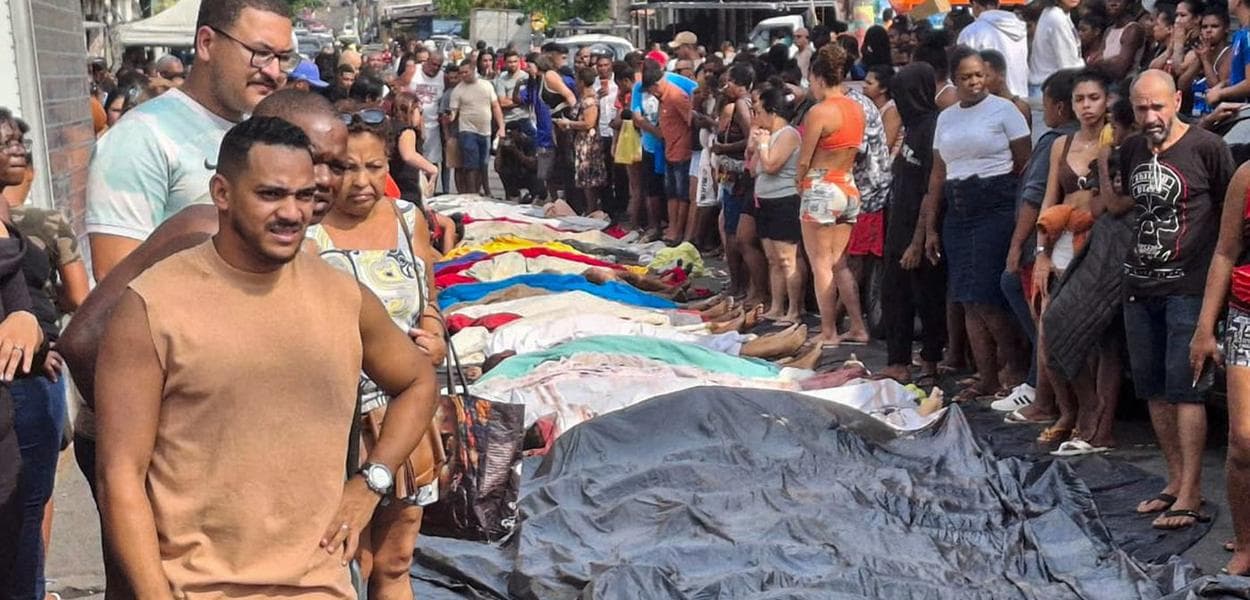247 – The United Nations (UN) condemned the massacre that occurred in the Penha Complex, in the North Zone of Rio de Janeiro, after the deadliest police operation in the state's history, which left at least 136 dead. The toll was released by the Human Rights Commission of the OAB-RJ, after residents removed 72 bodies from a wooded area on Wednesday morning (29). The action, conducted under the government of Cláudio Castro, provoked outrage inside and outside the country.
The bodies were taken to São Lucas Square, on João Lucas Road, where tarpaulins were spread out to hold the victims. According to witnesses, the dead were found in Serra da Misericórdia, the main point of confrontation in the operation, and in a second area known as Vacaria, where there are still reports of corpses.
Activist Raull Santiago, who helped remove the bodies, reported on social media the scale of the tragedy: “More tarpaulins have been stretched out to accommodate the bodies that are being found,” he wrote, sharing images of the scene.
Four police officers are among the victims.
Among the dead are four police officers, and nine others were injured in the shootouts. According to authorities in Rio de Janeiro, the operation aimed to execute 100 arrest warrants against members of Comando Vermelho, the main criminal faction in Rio.
The main target would be Edgar Alves de Andrade, known as Doca, identified as the organization's leader on the streets. Faced with the escalating violence, the anonymous tip line announced a reward of R$ 100,000 for information about his whereabouts—the largest amount since the case of Fernandinho Beira-Mar, who was first arrested in 2001.
International reaction and demands from the UN
The seriousness of the operation had international repercussions. The UN High Commissioner for Human Rights published a statement saying it was “horrified by the ongoing police operation in the favelas of Rio de Janeiro” and demanded swift and effective investigations into the deaths. The body also recalled that Brazil has international obligations in the field of human rights and must guarantee accountability and reparations for the victims.
#Brazil: We are horrified by the ongoing police operation in favelas in Rio de Janeiro, reportedly already resulting in deaths of over 60 people, including 4 police officers.
— UN Human Rights (@UNHumanRights) October 28, 2025
This deadly operation furthers the trend of extreme lethal consequences of police operations in Brazil’s…
The NGO Human Rights Watch also condemned the state's security policy:"Rio needs a new public security policy that stops encouraging confrontations that victimize residents and police officers," the organization stated.
Federal government reacts and the Security Amendment is brought forward.
In Brazil, the operation had strong political repercussions. The Public Defender's Office denounced abuses and violations committed during the action. Given the seriousness of the situation, the federal government ordered a delegation to be sent to Rio de Janeiro, and President Lula convened an emergency meeting with the top officials of public security.
In response, the Chamber of Deputies decided to expedite the analysis of the Public Security Amendment, a proposal that seeks to improve integration between federal and state forces. Governor Cláudio Castro, in turn, asked the Ministry of Justice to send ten imprisoned criminal leaders to maximum security penitentiaries—a request that was granted.
The massacre in the Penha Complex exposes once again the failure of the policy of armed confrontation in the favelas and reignites the debate about the security model adopted by the state government. Demands from the UN and human rights organizations place Rio de Janeiro under strong international pressure, requiring urgent changes to interrupt the cycle of violence that has victimized residents and public officials for decades.

